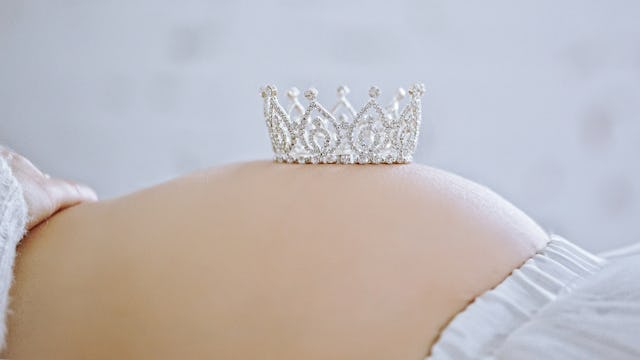14 Regal Names You Don't Have To Be Royalty To Use

We know that royal baby names spark trends, but royal titles do too: just ask the parents who named 569 boys and 415 girls Royal last year.
Or, for that matter, the parents of kids named King, Prince, Princess, Duke, or Noble.
Even celebrities have joined in on the trend (or maybe bolstered it along). Kourtney Kardashian’s son’s name is Reign, and rapper T.I. has a son whose middle name is Ya’Majesty.
Every kid has an exalted status — in their parents’ eyes, if not the world’s — but what about those parents who don’t want to name their kid something as obvious as King?
If this is you, you’re in luck. The meanings of each baby name on this list are royalty-related, but the names are more subtle, without the “BOW DOWN TO ME” boldness of the actual titles.
1. Tallulah
Though the etymology of this name isn’t 100% certain, it is said to be the Anglicized version of the Irish name Tuilelaith, meaning “princess of abundance.”
2. Brendan
Another Irish name, this one was originally Bréanainn, derived from a Welsh word meaning “prince.” Its Latin form became Brendanus, which is where we get the Brendan we know today. (And if you look at the last four letters, well, you’ll see why this is a good thing.)
3. Rani
In Sanskrit, this name means “queen.” It received a boost in popularity when Kate Hudson used it for her daughter, Rani Rose, who was born in October 2018. It also means “a song” in Hebrew, and can be a unisex name.
katrinaelena/Getty Images
4. Kian
Not to be confused with the similarly-pronounced Irish name Cian, which means “ancient,” Kian is of Persian origin and means “king.”
5. Malka
This name means “queen” in Hebrew. If you feel like adding an extra letter, there’s always the option of Malika, which means the same thing but has Arabic origins.
5. Taj
A word name, used to describe a crown worn by high-ranking Indian princes — but this can be a great unisex name, so use it even if you have a princess.
6. Kelila
In Hebrew, this name means “crown of laurels.” Historically, laurel crowns were worn as a symbol of nobility, victory, and leadership. It is also sometimes spelled with an H at the end: Kelilah.
7. Rex
The Latin word for “king,” Rex was once the quintessential dog name. Thankfully, it has now fallen out of popularity with the canine population and, due in part to its trendy “X” ending, is increasingly in vogue for actual human babies.
8. Sarai
This name means “my princess” in Hebrew, an adorable meaning for a daughter. It’s also a lesser-used, more unique alternative to Sarah. The Biblical character Sarah was named Sarai, until after the birth of her son.
9. Alaric
Alaric I was the name of an actual king, the first king of the Visigoths, who famously sacked Rome in 410 A.D. As such, this name means “ruler of all.”
sarahwolfephotography/Getty
10. Reina
“Reina” is the Spanish word for “queen,” so if you’re a Spanish-speaker, this may not be any less obvious than Queen itself. But it’s still a beautiful, regal name, and won’t be as easily recognizable to anyone who doesn’t speak Spanish.
11. Idris
A Welsh name meaning “impulsive prince,” most people are familiar with it thanks to actor Idris Elba. But his actual first name is Idrissa, which is the West African version.
12. Atarah
This name means “crown” in Hebrew. It can also be spelled Atara, but here’s a fun fact: Atarah backwards is Harata, which is said to be the Maori version of Charlotte. And Charlotte, as we all know, is a real-life princess.
13. Emyr
Derived from the Welsh word for “king” or “lord,” this name is seen across other cultures, too — as Emir in Turkish, and Amir in Arabic.
There are so many great ways to impart a royal feel to your child’s name, without giving them an actual title. Could one of these names be your baby’s “crowning glory?”
Browse thousands of names and tons of inspirational lists in the Scary Mommy baby name database!
This article was originally published on